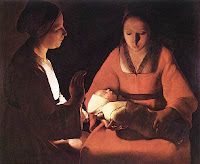This next Sunday the choir at our church will be presenting a Cantata, "Go Tell It!" There will be one service at 10:00, so there will not be a sermon. So what follows are some interesting links to sites concerning the origins of Advent,Christmas and Epiphany. Obviously - or it should be obvious to anyone with a healthy sense of historical development and change - Christmas has not always been celebrated as we do now. Like most festivals and holidays, it has undergone a variety of changes and it has an interesting evolutionary history.

The Catholic Encyclopedia Online has an in-depth and rather scholarly look at the origins and early testimonies to the dating and celebration of Christ's birth. Highlights: Possible connections with the roman festival of Sol Invictus (the Victorious Sun), various pagan accretions as Christianity spread throughout Europe and Asia, earliest mention of anything celebrating the birth of Jesus dates to about the year 200 C.E.
Any websites that I glanced through point out the pagan origins of the observance of the birth of Jesus being dated to December 25. There is basically no dispute of these factors by any credible scholar or church hierarchy. The fact of the matter is that Jesus was born into obscurity and no records of his birth were kept, nor were any preserved by the early Christian community. For the early church, what was significant was the crucifixion and resurrection of Jesus, not his birth. It was his sacrifice on the cross that affected salvation for humankind. His birth was taken as a given, although some early Christian groups, later deemed to be heretical, held beliefs that Jesus was not a physical being. Docetists taught that he only appeared to be physically human. Because of this belief, his physical birth was of no concern, in fact probably didn't occur.
Celebration of Christmas developed slowly, probably as a response by the growing Church that tried to supplant the celebration of pagan festivals with celebrations that were connected to the Christian message. This practice by the Christian Church over the centuries demonstrated the flexibility and malleability of Christianity to adapt to the thought-world and cultural practices of the various peoples across the world that have embraced its message.
Of course, not everybody views this as a good thing. Fine, but that doesn't negate the fact that Christianity has been flexible and that it has a rich history of development, change and adaptation. Which leads to this conclusion: Christians should feel free to find those observances and celebrations that enable them to reflect upon the mysteries of Christmas:

- How it is that Jesus, son of Mary and Joseph was also the Son of the One True God - of one substance with the Divine Father. (See the Wikipedia discussion of the Nicene Creed, and a discussion of the Trinity)
- The implications of a deity that chooses to share the circumstances of life in this world with humanity
- How viewing God as the Prime Giver of Gifts might affect your life
- How the stories about shepherds, angels, raging tyrants, wise men from the East, a virgin open to the surprises of God might suggest a way of living in this uncertain and unpredictable world.
If you have any reflections on this, post comments to this blog. And have a Merry Christmas!




Comments
Post a Comment